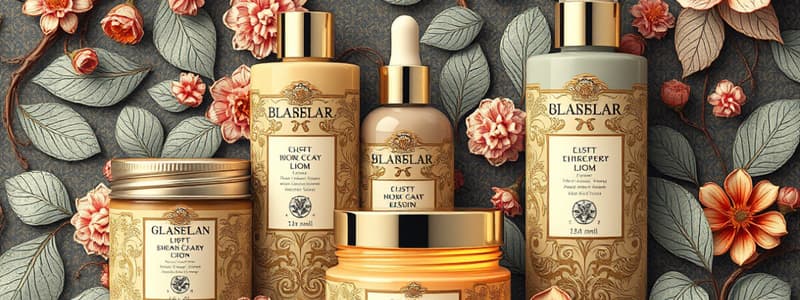Podcast
Questions and Answers
What are botanicals made from?
What are botanicals made from?
- Plants and herbs (correct)
- Recycled plastic
- Animal fats
- Chemicals
What is NOT among the components of lipids?
What is NOT among the components of lipids?
- Sterols
- Phospholipids
- Botanicals (correct)
- Ceramides
What is NOT something from which healing agents are made?
What is NOT something from which healing agents are made?
- Aloe
- Chamomile
- Licorice
- Recycled plastics (correct)
What is a possible advantage of synthetic ingredients over natural ingredients?
What is a possible advantage of synthetic ingredients over natural ingredients?
When is a manufacturer responsible for a client's allergic reaction to a product?
When is a manufacturer responsible for a client's allergic reaction to a product?
When is the salon responsible for a client's allergic reaction to a product?
When is the salon responsible for a client's allergic reaction to a product?
What is true of organic labeling standards for cosmetics in the United States?
What is true of organic labeling standards for cosmetics in the United States?
What is NOT an area requiring approval from the Food and Drug Administration (FDA)?
What is NOT an area requiring approval from the Food and Drug Administration (FDA)?
What term refers to skin-freshening lotions with a low alcohol content?
What term refers to skin-freshening lotions with a low alcohol content?
What is NOT among the purposes of functional ingredients in cosmetic products?
What is NOT among the purposes of functional ingredients in cosmetic products?
What is NOT true of glycerin?
What is NOT true of glycerin?
What term refers to an exfoliating cream that is rubbed off the skin?
What term refers to an exfoliating cream that is rubbed off the skin?
What is grapeseed extract?
What is grapeseed extract?
What are hydrators?
What are hydrators?
What are alpha hydroxy acids?
What are alpha hydroxy acids?
What type of product does NOT sometimes include alcohol?
What type of product does NOT sometimes include alcohol?
What is NOT true of aloe vera?
What is NOT true of aloe vera?
Flashcards
Botanicals
Botanicals
Substances derived from plants and herbs used in various products, including cosmetics.
What is NOT a component of lipids?
What is NOT a component of lipids?
Lipids are composed of fatty acids, glycerol, and sometimes other molecules like phospholipids. Botanicals are not a constituent of lipids.
What is NOT a source of healing agents?
What is NOT a source of healing agents?
Healing agents are primarily derived from natural sources like plants, minerals, and animal products. Recycled plastics are not a source of healing agents.
Possible advantage of synthetic ingredients over natural ingredients
Possible advantage of synthetic ingredients over natural ingredients
Signup and view all the flashcards
When is a manufacturer responsible for allergic reactions?
When is a manufacturer responsible for allergic reactions?
Signup and view all the flashcards
When is a salon responsible for allergic reactions?
When is a salon responsible for allergic reactions?
Signup and view all the flashcards
What is true of organic labeling for cosmetics in the US?
What is true of organic labeling for cosmetics in the US?
Signup and view all the flashcards
What is NOT regulated by FDA?
What is NOT regulated by FDA?
Signup and view all the flashcards
What are fresheners?
What are fresheners?
Signup and view all the flashcards
What is NOT a purpose of functional ingredients?
What is NOT a purpose of functional ingredients?
Signup and view all the flashcards
What is NOT true of glycerin?
What is NOT true of glycerin?
Signup and view all the flashcards
What is Gommage?
What is Gommage?
Signup and view all the flashcards
What is grapeseed extract?
What is grapeseed extract?
Signup and view all the flashcards
What are hydrators?
What are hydrators?
Signup and view all the flashcards
What are alpha hydroxy acids?
What are alpha hydroxy acids?
Signup and view all the flashcards
What type of product does NOT include alcohol?
What type of product does NOT include alcohol?
Signup and view all the flashcards
What is NOT true of aloe vera?
What is NOT true of aloe vera?
Signup and view all the flashcards
Study Notes
Skin Care Products: Chemistry, Ingredients, and Selection
- Botanicals are derived from plants and herbs, emphasizing their natural origins in skincare.
- Lipids consist of various compounds; botanicals are not one of them.
- Healing agents are sourced from natural substances like licorice, aloe, and chamomile, not recycled plastics.
- Synthetic ingredients can lead to fewer allergic reactions compared to natural counterparts.
- Manufacturers are liable for allergic reactions if products are used directly from their packaging.
- Salons hold responsibility for allergic reactions if products are bulk-purchased and repackaged.
- In the U.S., there are no strict organic labeling standards for cosmetics, which can lead to confusion for consumers.
- The FDA does not require approval for cosmetics manufacturing, but safety, labeling, and claims require it.
- Fresheners refer to skin-freshening lotions with low alcohol content, beneficial for skin hydration.
- Functional ingredients are designed for performance, such as spreading and texture, not affordability.
- Glycerin is a strong humectant and excellent skin softener; it does not function as a weak water binder.
- Gommage is a type of exfoliating cream that is rubbed off the skin, providing an effective exfoliation method.
- Grapeseed extract acts as a powerful antioxidant with soothing properties, beneficial in skincare formulations.
- Hydrators are ingredients that attract water to the skin's surface, enhancing skin moisture and health.
- Alpha hydroxy acids are known for their exfoliating properties by loosening bonds between dead skin cells.
- Paraffin masks typically do not contain alcohol, distinguishing them from other skincare products like lotions or astringents.
- Aloe vera is a popular botanical in cosmetics due to its emollient and hydrating qualities, contrary to being the least popular.
Studying That Suits You
Use AI to generate personalized quizzes and flashcards to suit your learning preferences.




